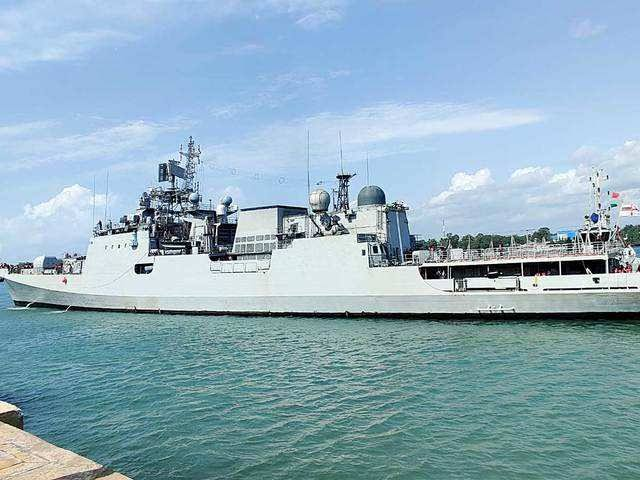From Kenya to Guam, India outlines sphere of interest in the Indo-Pacific with string of naval exercises
Keen on demonstrating its sphere of interest mainly in the Indian Ocean, but also with a spur in the Pacific, the Indian navy has carefully deployed its warships for exercises with like-minded countries in the Indo-Pacific region.

By IANS
Keen on demonstrating its sphere of interest mainly in the Indian Ocean, but also with a spur in the Pacific, the Indian navy has carefully deployed its warships for exercises with like-minded countries in the Indo-Pacific region.
The Indian navy’s state-of-the art stealth frigate, Talwar has just finished participation in Cutlass Express 2021 of the East African coastline of the Indian Ocean. The warship exercised in massive multinational manoeuvres steered by the Africa Command of the United States. The participants included 12 East African countries, the UK, European Union Naval Force Somalia (EUNAVFOR), Critical Maritime Routes Indian Ocean (CRIMARIO), EUCAP Somalia, and Interpol, apart from the International Maritime Organisation (IMO) and the United Nations Office on Drugs and Crime (UNODC),
The exercise was a combined effort to enhance familiarity with Indian Ocean waters in a critical zone extending from the Horn of Africa to the Gulf of Aden—a prime route for commercial shipping heading to Europe, Africa and Asia. International concerns have heightened as this area has been badly hit by piracy and international terrorism , triggering the need for international collaboration.
This year, the exercise was held in close proximity to Djibouti, Kenya, Madagascar, and the Seychelles—areas of prime interest to India.
The manoeuvres take place as a follow up to the visit to Kenya in June by External Affairs Minister, S. Jaishankar. India, during that visit had discussed the security situation in the Indo-Pacific region, including Horn of Africa, especially the rise of international terrorism in the littoral states.
“Kenya is in fact India’s maritime neighbour and is an important stakeholder in the geopolitics of the Western Indian Ocean. Moreover, just like India, it is a non-permanent member of the United Nations Security Council for the 2021-2022 term. Therefore, EAM’s visit to Kenya is an opportunity for India to engage on a range of bilateral, regional as well as multilateral issues,” said Sankalp Gurjar, a research fellow at the Indian Council of World Affairs (ICWA) in an article published in India Narrative ahead of Jaishankar’s visit.
Having identified Kenya as a partner in the Indian Ocean, New Delhi reinforced its special relationship with Nairobi by deploying the Talwar in a separate exercise with Kenya following the Cutlass Express manoeuvres.
The Indian warship exercised with Kenya Navy Ship Shujaa off the port of Mombasa .
“Post conclusion of exercise Cutlass Express 2021 INS Talwar undertook a Maritime Partnership Ex with Kenya Navy Ship Shujaa,” an Indian navy spokesperson in Mumbai tweeted.
India’s Ministry of Defence said that the Talwar’s visit is further going to strengthen “ India’s commitment to the countries along the East Coast of Africa and the Western IOR”.
While the Talwar was engaged in manoeuvres in the Western Indian Ocean, two other naval ships were steaming into Brunei, marking India’s stakes across the strait of Malacca in part of the West Pacific as well.
During their stay in Brunei, the Indian ships participated in an exercise with ships of the Royal Brunei Navy.
“Indian Naval Ships Shivalik and Kadmatt arrived at Muara, Brunei as part of their deployment to South East Asia on 09 Aug 21,” India’s defence ministry said in a statement.
Both the ships belong to the Indian Navy’s Eastern Fleet. Based in Visakhapatnam under the Eastern Naval Command, the fleet has acquired high importance in tune with India’s ASEAN-centric Act East policy.
From Brunei, the ships will head to Guam, for the much larger Malabar-21 exercises with the US, Japan and Australia.
The Malabar-21 off Guam, which is the headquarters to the Indo-Pacific command of the US, has a message for China, which is flexing its muscles in the South China Sea, riding on disputes with several countries belonging to the 10-nation ASEAN. But Indian officials insist that India’s visible presence from the East African coastline to Guam is an elaboration of the inclusive doctrine summed up by the acronym SAGAR—Security and Growth for All in the Region (SAGAR).